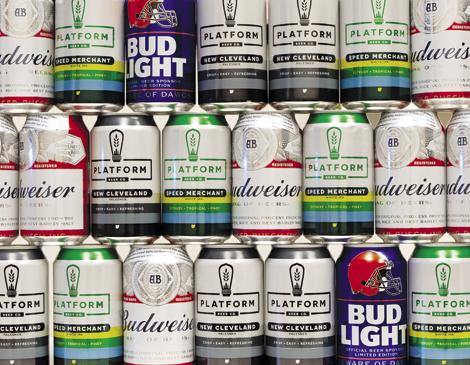Platform Beer Co. has always been brewing big ideas.
The small-batch 100-seat Ohio City brewery opened in 2014, ahead of Cleveland’s recent craft brew wave. In its first year, it was known for creating one-off brews and longtime loves as part of a rotating list of eight to 12 house-made drafts, such as the floral Pilsner and pale ale hybrid New Cleveland Palesner.
Two years later, co-owners Paul Benner and Justin Carson leveled up by turning the 120,000-square-foot former Leisy Brewing Co. building into a production facility and opening a second location in Columbus. It’s since created more than 600 recipes for stouts, lagers and meads, evolving from a Cleveland-based hipster hangout into a regional powerhouse.
That’s exactly why Anheuser-Busch InBev came calling. In August, the national company announced its acquisition of Platform Beer Co. As Anheuser-Busch InBev’s latest acquisition, Platform joins 13 other craft breweries, such as North Carolina-based Wicked Weed. Benner hopes the move helps double Platform’s distribution from 30,000 barrels to more than 50,000 in 2020.
“We are very proud of what we’ve built and it didn’t come overnight,” says Benner.
Although Benner has yet to see the full fruits of the deal, he’s already had pushback online from Clevelanders concerned that Platform will lose sight of what made them unique in the Cleveland market.
“[Anheuser-Busch InBev] equates acquisition with innovation,” says Ohio Craft Brewers Association deputy director Justin Hemminger in a written statement to Cleveland Magazine. “AB/InBev’s acquisitions are part of an ongoing strategy to pass off their purchased breweries as authentic and local, relying on a basic obfuscation of who truly owns the brewery and where the money goes.”
Prior to this new deal, Platform had been attempting to expand by courting outside funding from banks and other sources for about a year in an effort to open Phunkenship, a barrel souring facility in the Clark-Fulton neighborhood, and additional taprooms in new markets.
Although specific financial details of the deal were not provided, Benner says he and Carson maintain some autonomy over Platform’s daily operations and its future vision. That means they’ll get to experiment with new beer styles such as seltzers and low-cal options — but it also means they’re securing a financially stable future by offering health insurance, a 401(k) and other benefits to more than 100 employees.
“We’ve never been able to offer our employees that,” says Benner. “Now we don’t have to figure that out.”
Benner hopes people will come to understand that, from his point of view, this doesn’t change the platform his brewery has run on from the very beginning.
“At the end of the day, it’s about being able to keep solid liquid in cans and there’s nothing that they are doing that is going to hinder that fact,” says Benner.




